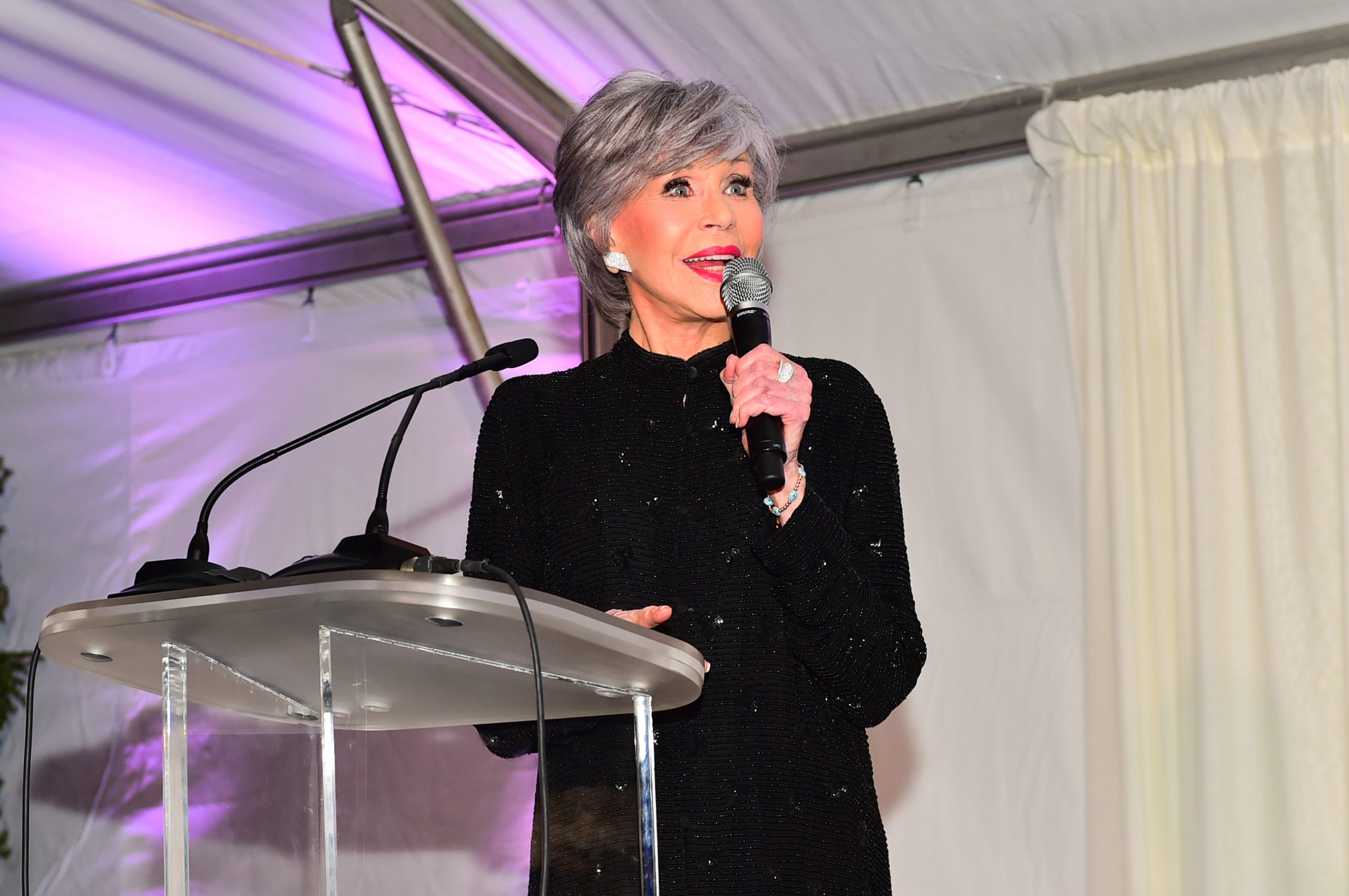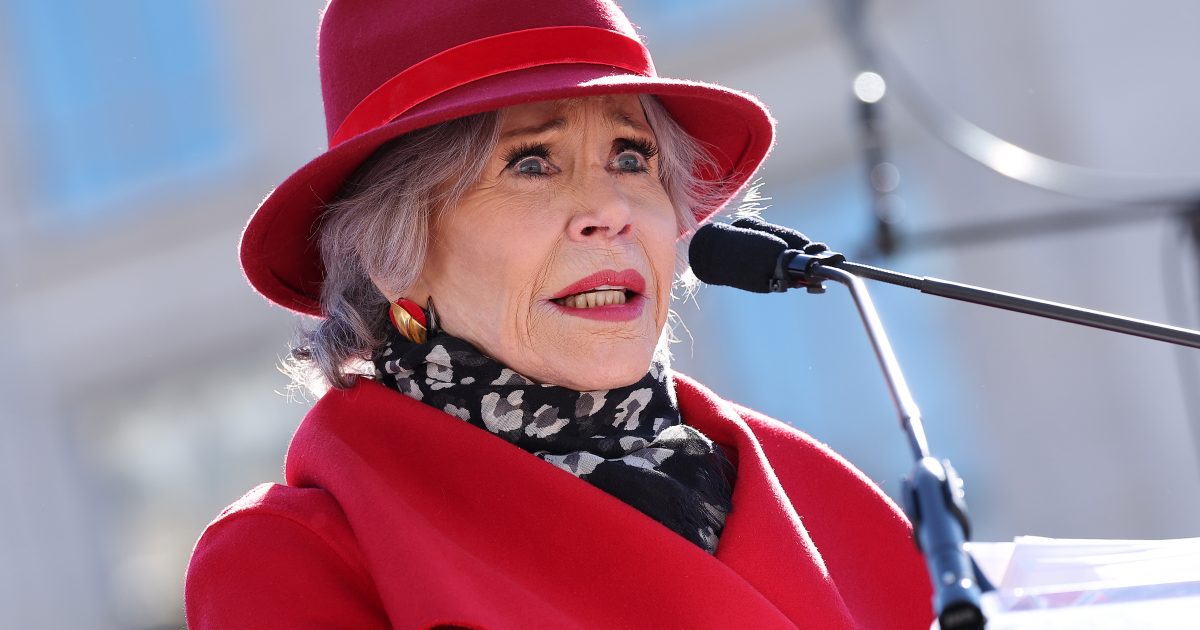Jane Fonda Celebrates Remission
- Jane Fonda, 84, says she's in remission after being diagnosed with non-Hodgkin's lymphoma earlier this year.
- Her announcement comes about three months after she revealed on Instagram that she had been undergoing chemotherapy treatments after getting diagnosed with non-Hodgkins lymphoma, a type of cancer that affects the body's immune system.
- Symptoms of non-Hodgkin’s lymphoma include swollen lymph nodes, abdominal and chest pain, fevers, fatigue and weight loss.
- The actress and activist also beat breast cancer in 2010 and skin cancer on her lip in 2018.
Fonda’s good news comes after the two-time Academy Award winner revealed her lymphoma diagnosis in a lengthy Instagram post in September, and said she already started undergoing chemotherapy. But as of this month, the mom of three no longer needs to receive treatment as her body is no longer showing signs or symptoms of the cancer.
Read MoreLATEST BLOG POST: BEST BIRTHDAY PRESENT EVER!!! https://t.co/l3H5jxEr40 pic.twitter.com/R8X8GBXqxj
— Jane Seymour Fonda (@Janefonda) December 15, 2022
Fonda, who previously beat breast cancer in 2010 and skin cancer on her lip in 2018, voiced optimism when she was first diagnosed with lymphoma, as she called it is a “very treatable cancer” in which “80% of people survive.”
When she announced the news on Instagram on September 2, she said her cancer was scheduled for six months and wrote, “I'm also lucky because I have health insurance and access to the best doctors and treatments. I realize, and it's painful, that I am privileged in this.
She added, "We're living through the most consequential time in human history because what we do or don't do right now will determine what kind of future there will be.
“I will not allow cancer to keep me from doing all I can, using every tool in my toolbox and that very much includes continuing to build this Fire Drill Fridays community and finding new ways to use our collective strength to make change."

What is Lymphoma?
Lymphoma is a cancer of the immune system, which begins in a specific kind of white blood cell called a lymphocyte, located in the body's lymphatic system. It is one of about 100 different types of blood cancers that affect nearly 200,000 Americans every year.
In cases of lymphoma, the lymphocytes multiply and build up in the lymph nodes and other tissues, making it more difficult for your immune system to launch an effective attack against invading germs.
As a result, the body becomes more prone to infections and other illnesses.
The disease is broken up into two main categories: Hodgkin Lymphoma and non-Hodgkin Lymphoma.
Doctors make a determination by examining the white blood cells within the body.
If they are unable to detect the Reed-Sternberg cell (a giant cell derived from B lymphocytes), then it is classified as non-Hodgkin. If the cells are present, then it is classified as Hodgkin.
Jane Fonda's Other Cancers
The Academy Award winner revealed in 2010 that she experienced a breast cancer scare after doctors discovered a small, non-invasive tumor. Fonda underwent a procedure at the time, and her representative declared her "cancer-free." In 2016, Fonda had a mastectomy before the Golden Globe Awards.
However, Fonda's battle with cancer didn't stop there.
In 2018, while speaking to the "TODAY" show, Fonda addressed bandages on her face by explaining she had cancer taken away from her lip.
"Well, the world is falling apart, what's a lip?" Fonda asked. "Yeah, they did (biopsy it.) I'm going to be fine, thanks."
Indeed Fonda's skin cancer treatment was minor compared to her mastectomy procedure.
A mastectomy removes either one or both breasts. It's usually done to treat breast cancer, but other women have the surgery to prevent a breast cancer diagnosis if there's a history of the disease in their family.
"Depending on the size and other features, such as family history, a patient may opt for more aggressive surgery," Dr. Elizabeth Comen, a medical oncologist at Memorial Sloan Kettering Cancer Center, tells SurvivorNet.
In addition to risk factors, there are a few surgery options patients should keep in mind while approaching physicians for breast cancer treatment.
When Should I Get A Mammogram?
Dr. Ann Partridge previously explained to SurvivorNet when women should consider a mastectomy during breast cancer treatment.
"When I talk to a woman who comes to me and she has breast cancer, I evaluate what the standard options for treatment for her are, which typically include cutting out the cancer which is either a lumpectomy if you can get it all with just a little scooping around of the area that's abnormal or a mastectomy for some women meaning taking the full breast because sometimes these lesions can be very extensive in the breast," Dr. Partridge, a medical oncologist at Dana-Farber Cancer Institute, said.
Thriving as a Cancer Survivor
A cancer diagnosis will change your life. But as we've seen with Jane Fonda, it is more than possible to thrive on the other side of your cancer journey.
Take Marecya Burton, for example. She was diagnosed with ovarian cancer at just 20 years old. Burton was a college student-athlete looking forward to graduation at the time, but all that had to change when she was forced to move home to start treatment.
Former College Cheerleader Reinvents Herself After Surviving Ovarian Cancer
"That was definitely challenging for me," Burton said in a previous interview with SurvivorNet. "I was looking forward to graduating."
She also had planned on pursuing a law degree after graduation another dream she had to give up.
"I really had to, in a sense, put my life on hold," she said. "Sometimes I look at where I am, and I can't help but wonder, would I be further had I not had my diagnosis?"
But instead of law school, Burton found a new passion: teaching. She became a high school teacher in Baltimore, Maryland, and she's since made peace with her new direction in life.
"I wouldn't change my career for the world," she says. "It's so fulfilling."
Other survivors, like Fernanda Savino, have said that cancer gave them a whole new perspective on life one that has allowed her to appreciate both her body and her relationships more than ever.
"I'm a lawyer, and I used to be such a workaholic," Fernanda previously told SurvivorNet. "I would work for long hours, and I would never make room for doctor appointments or anything like that.
"I started to take care of my health and be more respectful to my body, to me. I started to exercise more."
Like so many others, Fernanda also said she relied on a lot of support from her loved ones something she'll always be grateful for.
"I had all the support … my family, my friends, even the ones that weren't so close, they always were present," she said. "I don't know how I would have gotten through all of this without them."
Contributing: SurvivorNet Staff
Learn more about SurvivorNet's rigorous medical review process.


